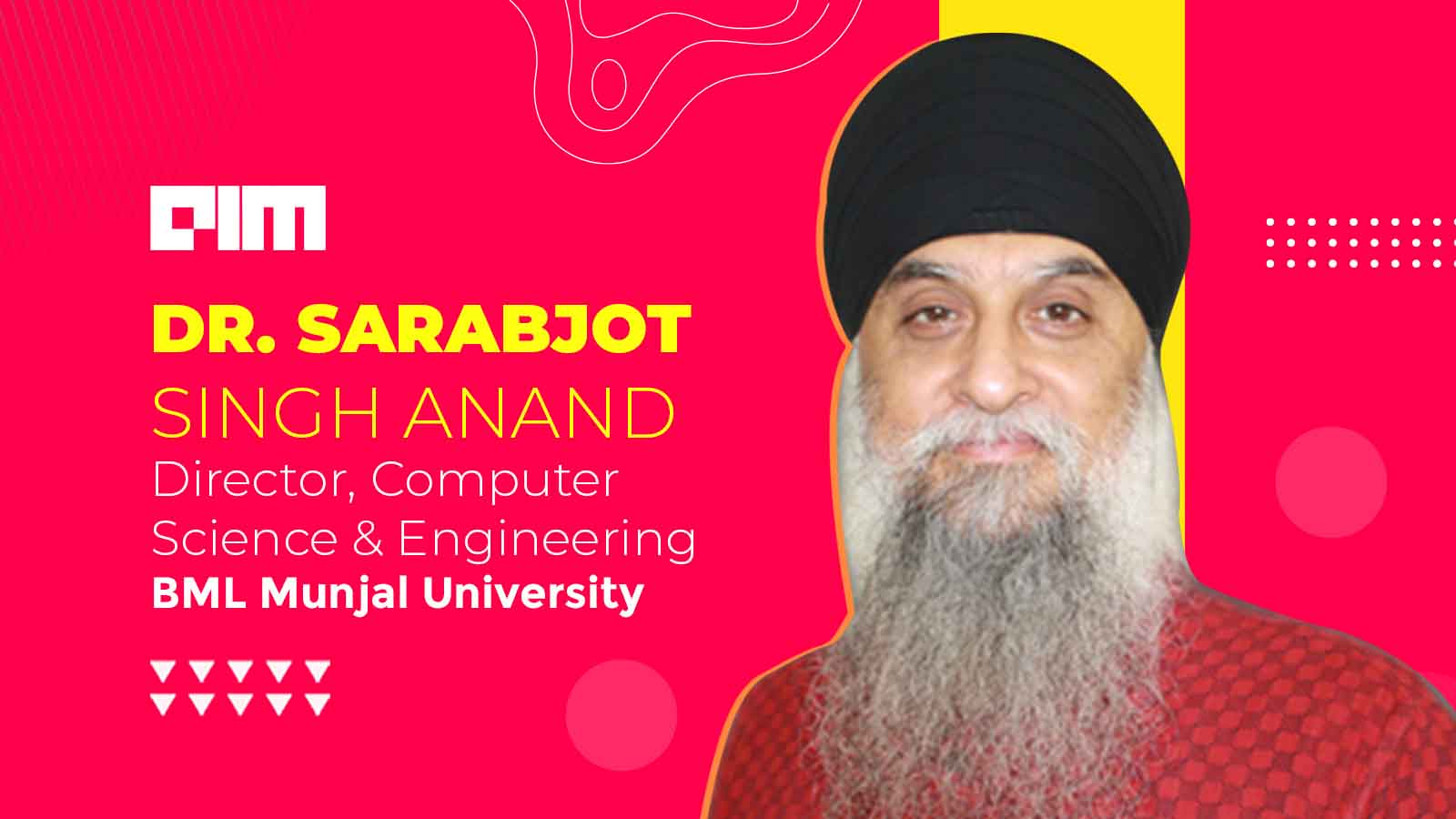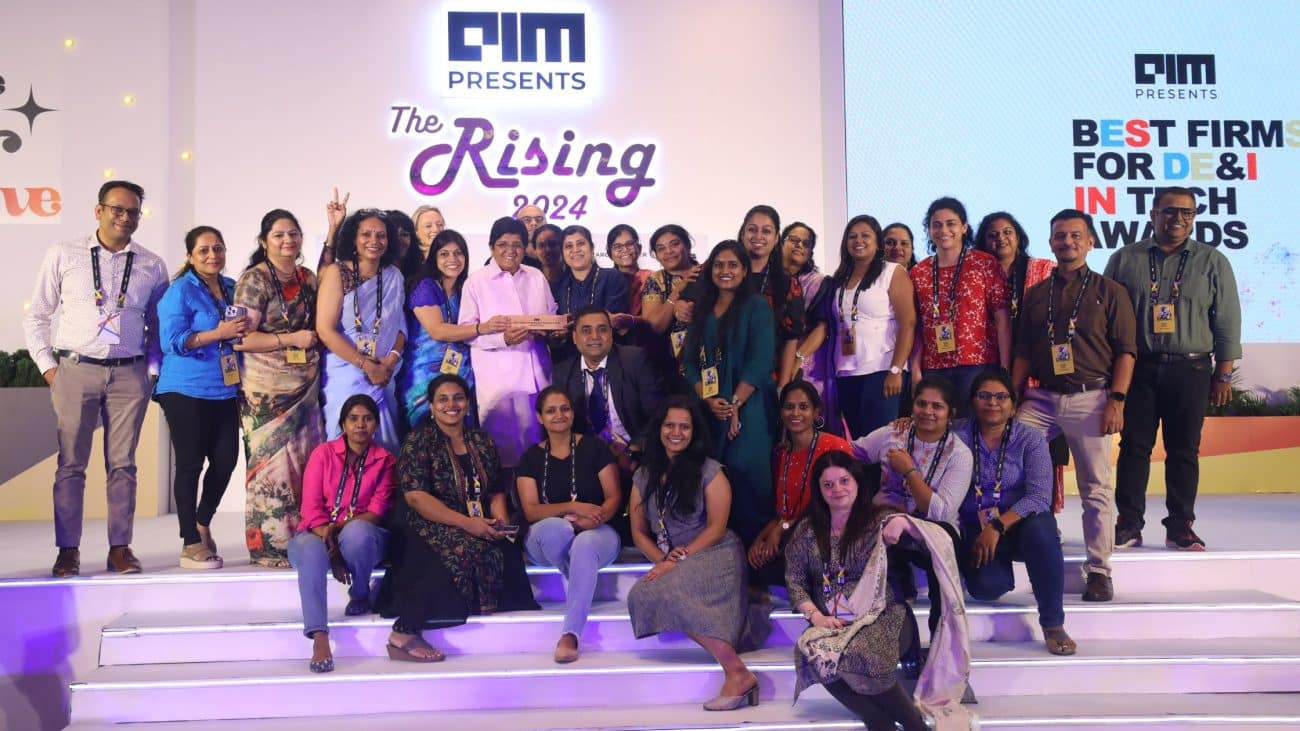The Harvard Business Review has called data science the ‘sexiest job of the 21st century’. And right on cue, the data science market is growing at a breakneck speed. However, Dr Sarabjot Singh Anand, Director, Computer Science & Engineering at BML Munjal University, believes people need to get into this domain for the right reasons, not for the higher salaries it commands, but for the joy it brings.
Analytics India Magazine recently sat down with Dr Sarabjot to discuss his views on the evolution of the data science market and how the university courses are contributing to this highly promising sector.
Dr Sarabjot has been involved in machine learning since its inception by developing algorithms, applying them to real-world problems, and training a host of data scientists in his capacities as an academic and an entrepreneur. Having published over 90 academic papers on machine learning while he was an associate professor at the University of Warwick and developing algorithms for various areas like recommender systems, prognostic models for chronic illnesses, churn prediction and house price prediction models, Dr Sarabjot is truly a pioneer in the field.
He has also co-founded Tatras Data, a lab-based data science consultancy and Sabudh Foundation, to train engineering students in machine learning and work on social problems in education, farming, governance, and the healthcare sector.
Edited excerpts:
AIM: Tell us about the curriculum and pedagogy of data science courses and programs at the university
Dr Sarabjot Singh Anand: Currently, our core offerings are the undergraduate programs, where our students get exposed to the field of data science in year one. We believe all engineers and scientists will need data skills in the future, and they must learn these skills early. This is coupled with the ‘Joy of Engineering,’ where they get hands-on to all sorts of wonderful applications with and without artificial intelligence. These courses also build the foundations of maths for the students.
This is followed by courses in data analytics, image processing, artificial intelligence and machine learning in year two and three. In the fourth year, the students who decide to specialise in data science and AI can pick up courses like natural language processing, deep learning, time series analysis and social network analysis, each with a substantial project to deliver on. In the same year, the students can also do a six-month program with the Sabudh Foundation or a company of their choice.
AIM: How do your programs stand out compared to similar courses in other universities?
Dr Sarabjot Singh Anand: Most industry-based courses do not have the required depth to train data scientists that can stand the test of time. They usually teach students only how to use libraries, so they get little exposure to real problem-solving. The folks teaching these courses also often don’t have a deep understanding of these subjects. A true data scientist has to have a strong base in programming, Bayesian probability, calculus, linear algebra, machine learning and deep learning. When students implement common machine learning algorithms in Numpy, they should truly understand how they work. The libraries are just the cherry on top.
Next, we have collaborated with Sabudh Foundation to expose our students to social good projects. Our students can choose to spend six months with the foundation, working on social impact projects, ranging from predicting the power output of a solar panel, building portable ECG devices to understand the impact of music on the human mind. Additionally, we run a webinar series where we bring world-renowned academics such as Rayid Ghani from CMU, Nasir Rajpoot from Warwick, and Bamshad Mobasher from DePaul, along with practising data scientists like Vikas Agrawal and Shailesh Kumar to speak to the students. And believe me, this is just a small sample of the collective intelligence that we expose our students to.
AIM: What are the competitive advantages your students and graduates stand to gain?
Dr Sarabjot Singh Anand: Experiential learning is not an afterthought at Munjal University; our curriculum is built around it. My students in the natural language processing course, for example, build a full-fledged news recommender system. They use different vectorisation methods to news, build a hybrid recommender, deploy it using Flask, and evaluate it. They even learn about generative models by generating clickstream data for evaluating the recommendations. Nowhere else they get that kind of exposure. This is just the tip of the iceberg. Every year, our students get an opportunity to work on real-world projects and get exposed to what it is like to work in the big bad world.
We also have a set of industry partners that we work with. The tech and AI conclaves that we organise, and the quality of speakers we attract to our webinar series, is second to none. I believe students need to be exposed to as many practitioners as possible, as it widens their horizons. Diverse experiences help them in understanding material from different perspectives. Further, it also allows students to pursue internships with these experts.
“A true data scientist has to have a strong base in programming, Bayesian probability, calculus, linear algebra, machine learning and deep learning.”
AIM: What are the challenges a university faces while creating a data science and analytics course?
Dr Sarabjot Singh Anand: Access to professionals is the most significant challenge universities face while building a data science course. Just theory is not enough; in the engineering and computing field, one needs to know how to solve real problems.
I have lived through this myself, and I believe that I am a better teacher today than at Warwick. This is a direct consequence of me having established Tatras Data in 2012 and having serviced real machine learning problems in the industry. That knowledge provides immense value when I teach and mentor students. It should be imperative that all engineering and computer science faculty to have worked in the industry for part of their career or consulting with the industry. We are also actively building a consultancy stream to expose faculty to real-world problems and provide the industry with solutions required to remain competitive in an increasingly global environment.
AIM: How can governments and corporations nudge students to take up STEM?
Dr Sarabjot Singh Anand: At Munjal University, we believe that contextualising learning is very important. Hence, in the first year, all our engineering students go through a module called the Joy of Engineering, where the students are taught to enjoy what they do.
I believe there is little to no emphasis on the joy of learning or the joy of working in our education system. From a young age, students learn that there is fun, and then there is studying — making them two different aspects of life. These youngsters grow up into those who believe that there is work that pays the bills, and then there is fun. This needs to change. The government needs to make this joy of learning happen at a very young age. Tinker labs is a great idea but will only be successful if executed upon well. We need people to be trained in pedagogy and technology, ready to travel to little schools in villages and excite students at a grassroots level. Equipment and infrastructure don’t make good schools; people do.
Additionally, quality training is still a concern. Edtech companies that have had large investments are under pressure to show revenue. Education must not be led by revenues. Also, the increasing numbers of people who fear losing their jobs to automation and the amount of marketing around data science as a career drive folks to do courses. Let’s not be mistaken; the citizen data scientist is a fallacy, as not everyone is wired to be a data scientist.
As a country, we have to stop being a seaweed that drifts with every wave that comes our way. It was IT in the 1990s, and it’s now data science. The wonderful thing about the planet we live on is that there is immense diversity all around us – in people, their interests and jobs. Let’s preserve that. You should follow your dreams. If everyone re-labels themselves on LinkedIn as a data scientist, it will hurt the industry as a whole when projects fail.
AIM: What advice do you have for aspiring data scientists?
Dr Sarabjot Singh Anand: Data science is a fascinating space to be in. My typical day consists of teaching students, talking to customers worldwide, working on some disruptive ideas in different domains, having a conversation with student groups, and working on social good applications of machine learning. There is no other job that can allow you to work in pretty much everyone else’s backyard. However, it’s a lot of hard work — preparing the data, staring at the output from algorithms, making sense of it, reading papers with Greek symbols, and continuously reinventing yourself. It is not for the faint-hearted.
On the other hand, it is also something that does not require a degree from IIT or a PhD; instead, it requires perseverance, thick skin and a belief that you can achieve anything you put your heart to.
An aspirant must attain a minimum aggregate of 60% in Physics, Mathematics, English and preferably Computer Science in class 12 board exams. In case the aspirant does not have computer science as a subject, any one of chemistry, biology and technical vocational subjects (as specified by AICTE) is considered. For Andhra Pradesh, Kerala, Telangana and Tamil Nadu State Boards aspirants, a minimum aggregate score of 70% is required. An aspirant should also have a minimum percentile of 60 in JEE (Main).
“At Munjal University, we believe that contextualising learning is very important. Hence, all our engineering students go through a module called the Joy of Engineering, where the students are taught to enjoy what they do.”
AIM: What is your placement strategy for your students?
Dr Sarabjot Singh Anand: Strategy for placement include —
- Curriculum with specialisation in analytics, which helps students gain an in-depth understanding.
- BMU has a lab called IBM lab on campus to provide skills in data science and business analytics.
- A total of eight-months internships spread across three-years in data science companies.
- The career guidance and development centre at BMU organises training sessions and industry talks.
Data Science recruiters who have participated in the BMU placement process are — TCS, Infosys, Goldman Sachs, Virtusa, Commvault Systems, Google, Deloitte, Hexaware Technologies, OnlineSales.ai, HCL Technologies, Accolite India, Merkle Sokrati, Nagarro, Cognizant, Tenovia, Zycus, Hanu Software, ZS Associates, Databeat, Smartserv, Xebia, Hitachi Vantara, NTT Data, Wipro, Mu-Sigma and more.
AIM: With many online courses and MOOCs currently available for data science enthusiasts to learn from, how does a professional degree make a difference in their career in the long term?
Dr Sarabjot Singh Anand: MOOCs continue to have large dropout rates and a lack of real project exposure. Data science, in industry, is very different from competing in Kaggle. To be successful in learning, one needs to have a well-curated curriculum that builds on the complexity of the subject and continuously reinforces the learning through applied hands-on work. As I see it, the best way to get there is through a professional degree.







































































































